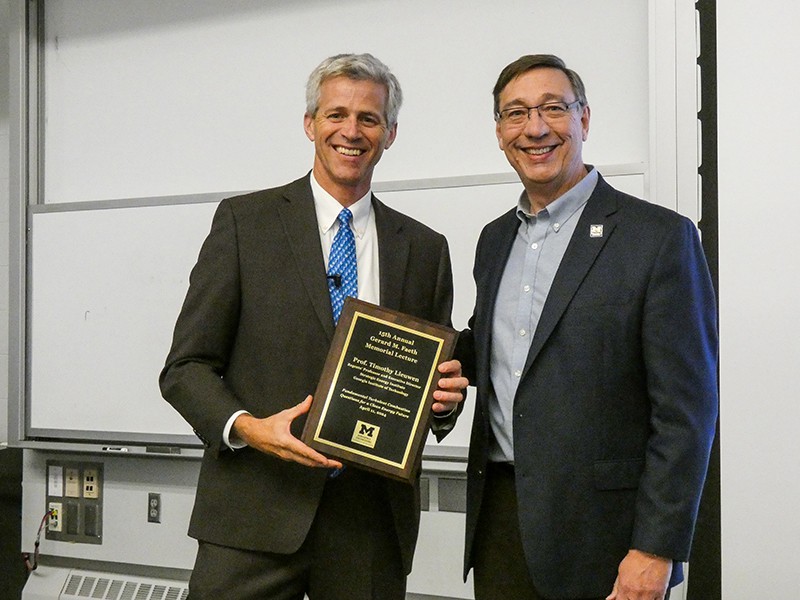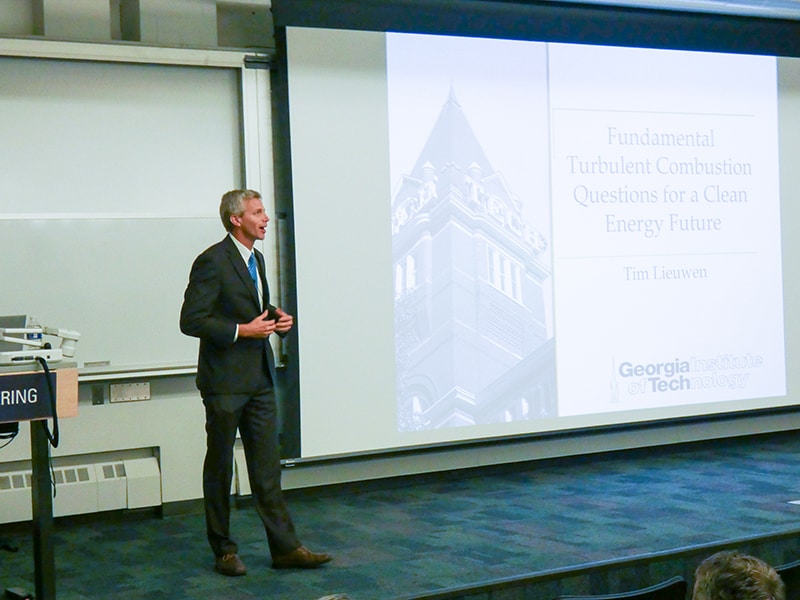
15th Annual Gerard M. Faeth Memorial Lecture
Honoree, Tim Lieuwen, presents “Fundamental Turbulent Combustion Questions for a Clean Energy Future”

Honoree, Tim Lieuwen, presents “Fundamental Turbulent Combustion Questions for a Clean Energy Future”
On April 11, 2024, students, faculty and staff gathered in the Boeing Auditorium along with professionals from outside the Michigan Aerospace Department for the 15th annual Gerard M. Faeth Memorial Lecture. Each year, the lecture honors the professional and personal contributions of Arthur B. Modine Professor of Aerospace Engineering, Gerard “Jerry” Faeth. This year’s honoree was Dr. Tim Lieuwen, the Regents’ Professor and Executive Director at the Strategic Energy Institute at Georgia Institute of Technology.
Jerry Faeth, a renowned researcher for his work in the aerospace industry, received his bachelor’s degree in mechanical engineering at Union College in New York in 1958. He went on to complete his Master’s and PhD in mechanical engineering and later accepted a joint appointment with the Department of Mechanical Engineering and the Applied Research Laboratory at Pennsylvania State University.
In 1985, Faeth joined the University of Michigan, where he soon became the Arthur B. Modine Professor of Aerospace Engineering and the Head of the Gas Dynamics Laboratories. His research led to his becoming a Fellow of the American Institute of Aeronautics and Astronautics (AIAA), winning the Heat Transfer Memorial Award from the American Society of Mechanical Engineering (ASME) and being awarded the Excellence in Research Award from the U-M College of Engineering.
Although he focused primarily on mechanical engineering, Faeth continuously expanded his knowledge in various fields, setting himself apart as a researcher. Faeth’s expertise extended across combustion science, heat transfer, propulsion systems and fluid dynamics. Throughout his career, he was awarded numerous honorary acknowledgments in research, academia and from various government organizations and professional societies where he was either a member or chair. Faeth was actively involved in several professional associations, and his contributions continued to expand as he advised organizations like NASA and the United States Government. His research yielded over 500 publications, focusing notably on laminar flames and soot processes.
In 1992 he received a Distinguished Engineering Faculty Research award, and soon after received the Stephen Atwood Award, the highest research award you can receive at the College of Engineering at U-M. Additionally, Professor Faeth was awarded a Distinguished University Professorship for his excellence in teaching and research, the highest honor a faculty member can receive at the University of Michigan. That same year, the Combustion Institute awarded him the Alfred C. Edigerton Gold Medal for his distinguished and continuing contributions to the field of combustion.
After his passing in 2005, the Department of Aerospace Engineering at U-M established the Gerard Faeth Memorial Fund to remember him and his many contributions to the industry and now sponsors this annual memorial lecture in his honor.

In honor of Jerry Faeth and the legacy he has left behind through the Memorial Fund, this year’s speaker, Tim Lieuwen, truly exemplifies dedication to the aerospace industry. Carlos Cesnik, the Richard A. Auhll Department Chair of Aerospace Engineering at U-M, commented, “We couldn’t have found someone as close to Jerry in terms of accomplishments as our distinguished speaker, Dr. Tim Lieuwen.”
Lieuwen is the founder and CTO of Turbine Logic, an analytics firm working in the energy industry, where he focuses on clean energy and propulsion. His work has contributed to commercialized innovations in the energy and aerospace sectors, and he has authored four books and over 400 other publications. He has held positions on numerous governing and advisory boards, was appointed by the DOE Secretary to the National Petroleum Council and is a board member of the ASME International Gas Turbine Institute.
He is also an elected member of multiple professional societies and a foreign Fellow of the Indian National Academy of Engineering. He has been awarded major awards, including the ASME R. Tom Sawyer Award, the AIAA Pendray Award and the ASME George Westinghouse Gold Medal.
As Lieuwen began his lecture, he remarked, “I was thinking about just hearing Professor Faeth give talks at conferences and what a great speaker he was. He was a really smart guy who did a lot of great stuff, but he was also really interesting and someone I’ve learned a lot from.”
Lieuwen focuses much of his work on practical issues related to emissions and high-efficiency cycles. During his lecture, he referenced an academic paper authored by Jerry Faeth and Jim Driscoll titled “Turbulent Premixed Hydrogen/Air Flames at High Reynolds Numbers,” which was published in 1981. From this, he dove into the problem of turbulent combustion, focusing on a more fundamental topic and zooming in on a basic science talk on combustion.
“Today, there’s a lot of interest in kinds of fuels, in the aviation sector that would be sustainable aviation fuels, in the power sector things like hydrogen or ammonia,” stated Lieuwen. “The issue of turbulent hydrogen combustion is singularly unique in the field of turbulent combustion, because there’s strong and unique interactions that don’t show up with any other fuel, and then just the general issue of emissions.”
He went on to explain that combustion is the source of emissions of any type of power plant. Whether you have fuel like hydrogen or a fossil fuel, you can make pollutant emissions like NOx. The issue of NOx production from renewable hydrogen combustion is a current and pressing issue that is gaining a lot of attention.
“One of the things that’s really interesting and fun that I would just generally say in this field, and many of the contributions have come straight out of this department, is just watching this field evolving from really a black art to a very quantitative science.”
Dr. Timothy Lieuwen’s presentation sparked immense discussion related to the various engineering challenges in relation to the consumption rate increase with turbulence. The room was ultimately captivated by his views on the research presented based on the work of Jerry Faeth. The lecture was then concluded with Professor Cesnik presenting Lieuwen with an honorary plaque in dedication to his joining us for the momentous occasion.